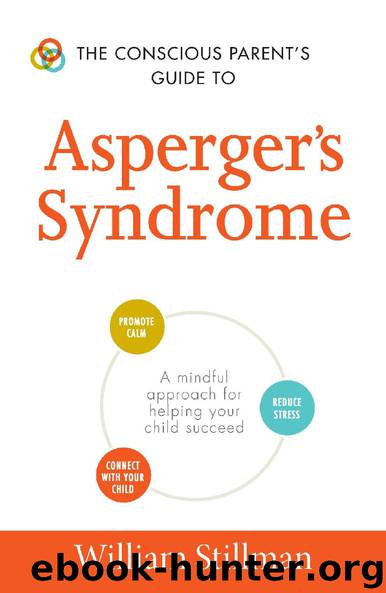The Conscious Parent's Guide To Asperger's Syndrome by William Stillman

Author:William Stillman [Stillman, William]
Language: eng
Format: epub
Published: 2015-11-06T00:00:00+00:00
The Dance of Reciprocal Flow
As metaphors and analogies help to enhance our understanding, consider that, in both instances, each child wishes to partake in the “Dance of Reciprocal Flow” (not to be confused with “The Electric Slide”). The first child is partnerless, awaiting an invitation to the dance. When the invitation doesn’t come, he may feel hopeless. He may internalize these feelings, frustrated by not understanding others or himself. This may lead to a sense of guilt or blame, which could fuel depression. The second child has leaped into the dance without first having learned the steps. He, too, is partnerless but believes that all those present are his exclusive dance partners, available to him at any given moment. Both children are set up to be singled out for their differences and potentially stigmatized for not knowing the dance that most everyone else appears to have learned naturally by picking up on spoken and unspoken social cues.
Developing friendships means either learning the Dance of Reciprocal Flow (and some are more masterful dancers than others) or approximating it well enough that one blends nearly seamlessly during the time spent on the dance floor. It is a gradual process. No one masters the dance immediately; you improve and gain more confidence as you practice the dance steps. As you’ve learned, most children with Asperger’s Syndrome assimilate information in ways that are concrete and visual.
As your child’s instructor in the Dance of Reciprocal Flow, you will wish to map this out for him, similar to the way that some people learn to dance by following the black silhouetted footprints positioned on the floor. As they memorize the dance routine and position of each step, they make fewer and fewer missteps. The dance becomes more fluid, requiring less effort and less thought. Finally, the footprint outlines fade altogether. They are now visible only in one’s consciousness, unseen by others. Some will require intermittent, periodic “polishing” to brush up on the dance steps; others will retain it always, permanently etched in their minds. The importance in learning the dance is to know when and where to buoy your partner so that you both work together to create one whole presentation.
How often have you had a friendship damaged, harmed, or extinguished altogether as a result of misunderstandings or misinterpretations of communication? It happens all the time, every day. You may have a natural advantage in having already learned how to adeptly discern slang and sarcasm, tempered with understanding body language, facial expressions, eye gaze, and the tone and timbre of voices. Remember, for many people with Asperger’s, this must all be taught and learned systematically. For being more intrinsic than average, those with Asperger’s tend not to assimilate such social nuances as fluidly or naturally as others for whom the same social conventions may come more easily.
Download
This site does not store any files on its server. We only index and link to content provided by other sites. Please contact the content providers to delete copyright contents if any and email us, we'll remove relevant links or contents immediately.
| Disabilities | Hyperactivity |
The Out-of-Sync Child by Carol Stock Kranowitz(2054)
The Gender Creative Child by Diane Ehrensaft & Norman Spack(1794)
Aspergirls by Rudy Simone(1697)
Your Soul's Plan by Robert Schwartz(1688)
Be Different by John Elder Robison(1650)
My Child's Different by Elaine Halligan(1516)
101 Tips for the Parents of Boys with Autism by Ken Siri(1495)
Meditation: Meditation For Beginners - How to Meditate For Lifelong Peace, Focus and Happiness (Mindfulness, Meditation Techniques) by Price Sara Elliott(1448)
The Sensory Child Gets Organized by Carolyn Dalgliesh(1447)
Asperger Syndrome (Autism Spectrum Disorder) and Long-Term Relationships by Ashley Stanford(1426)
ADHD by Mark Selikowitz(1393)
An Adult with an Autism Diagnosis by Gillan Drew(1354)
Nerdy, Shy, and Socially Inappropriate by Cynthia Kim(1350)
Animal-assisted Interventions for Individuals with Autism by Temple Grandin(1330)
The Yoga Bible by Christina Brown(1324)
Seeing Ezra by Kerry Cohen(1305)
Somebody Else's Kids by Torey Hayden(1264)
Baby Signing for Dummies by Jennifer Watson(1260)
The Complete Guide to Asperger's Syndrome by Tony Attwood(1239)
